|
|
|
Sort Order |
|
|
|
Items / Page
|
|
|
|
|
|
|
| Srl | Item |
| 1 |
ID:
141456
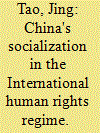

|
|
|
|
|
| Summary/Abstract |
This article uses a hard law—the Rome Statute of the International Criminal Court—to examine the depth of China's socialization in the international human rights regime and the relative weights of sovereignty and human rights norms in determining China's policy choices. It shows that the reasons for China's rejection of the Rome Statute are twofold. On the one hand, Chinese leaders have not fully internalized human rights norms, and they prioritize state sovereignty over human rights when making decisions. On the other hand, the legalized Rome Statute sets up an independent court with mandatory jurisdiction and grants the Prosecutor the ex officio right to investigate a crime. Such treaty provisions may have negative impacts on China's core sovereignty of territorial integration and regime security, thus imposing high sovereignty costs on China. Therefore, China resolutely voted against the Rome Statute, even if such an action made it a small minority outside the international mainstream. These findings indicate that China is still in a weak socialization stage and is not able to take on binding human rights and humanitarian obligations with high sovereignty costs.
|
|
|
|
|
|
|
|
|
|
|
|
|
|
|
|
| 2 |
ID:
141454
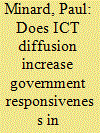

|
|
|
|
|
| Summary/Abstract |
Numerous scholars have suggested that ICT diffusion may lead to more responsive governance in China. To date, however, few empirical studies have been made of the political implications of China's Internet, and previous studies of the association between citizen access to information and government responsiveness have focused on democratic contexts, relying on electoral mechanisms as explanations for the observed positive relationship. This article investigates ICT diffusion and government responsiveness in China by examining data on the composition of government spending. Results indicate that increasing ICT diffusion is associated with a higher proportion of provincial government spending devoted to health and education, and a lower proportion devoted to capital construction. A collective action mechanism is proposed as a potential driver of these results.
|
|
|
|
|
|
|
|
|
|
|
|
|
|
|
|
| 3 |
ID:
141450
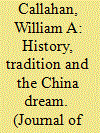

|
|
|
|
|
| Summary/Abstract |
How will China influence world politics in the twenty-first century? Many people answer this question by looking to Chinese history, and particularly to traditional models of Chinese world order. This essay seeks to complicate this question by asking which history, and which tradition? While it is common to look at China's pre-modern history as ‘tradition’, this essay argues that we also need to appreciate how ‘socialism’ is treated as a tradition alongside Chinese civilization. It does this by examining how China's public intellectuals appeal to two seemingly odd sources: Mao Zedong's 1956 speech ‘Strengthen Party Unity and Carry Forward Party Traditions’, and the ‘Great Harmony’ passage from the two millennia-old Book of Rites. It will argue that these two passages are employed as a way of salvaging socialism; the ideological transition thus is not from communism to nationalism, but to a curious combination of socialism and Chinese civilization. This new socialist/civilization dynamic integrates equality and hierarchy into a new form of statism, which is involved in a global competition of social models. Or to put it another way, what these two passages have in common is not necessarily a positive ideal, but a common enemy: liberalism, the West and the United States.
|
|
|
|
|
|
|
|
|
|
|
|
|
|
|
|
| 4 |
ID:
141453
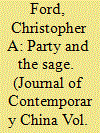

|
|
|
|
|
| Summary/Abstract |
The current bloom of quasi-Confucian political thinking and writing in the People's Republic of China (PRC), encouraged by the Chinese Communist Party (CCP) and deployed both to discredit Western ideals of democratic pluralism and to rationalize continued one-party rule in China, has been a long time coming. This article examines the origins of this line of thinking, its development since its first appearance with the CCP's cultivation of Confucius studies in the mid-1980s, and the current parameters of this discourse as it has taken a growing role in Beijing's domestic political and emerging geopolitical narrative.
|
|
|
|
|
|
|
|
|
|
|
|
|
|
|
|
| 5 |
ID:
141455
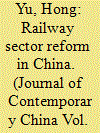

|
|
|
|
|
| Summary/Abstract |
The railway sector in China has undergone several major rounds of reform and institutional restructuring since 1986. These reform initiatives have largely been unsuccessful due to strong resistance from vested interest groups. The development of China's railway sector has raised some challenging issues that include the centralization of power in the Ministry of Railways (MOR), state monopoly control, rampant corruption and the accumulation of a huge debt burden. The 2013 railway reform initiatives have provided very little in the way of concrete measures to deal with these thorny issues but have instead created more controversy and problems in an already crisis-ridden sector. For the railway industry, the transformation from the mixed-function MOR to a monopolistic China Railway Corporation (CRC) will not necessarily lead to better railway management.
|
|
|
|
|
|
|
|
|
|
|
|
|
|
|
|
| 6 |
ID:
141457
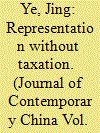

|
|
|
|
|
| Summary/Abstract |
The question of why some authoritarian regimes choose to incorporate institutions of democracy such as village elections into their governing systems remains largely unanswered. As a typical case of a resilient authoritarian state that implements democracy in its villages, China has provided an invaluable case for researchers to study. Current theories focus on the influence of political elites and rural forces separately. Insightful as they are, these theories are invalid as an explanation of the variation of local governance in China across time and thus are incomplete. It should be recognized that central fiscal strategies have great effects on local governance. Specifically, if the central government largely relies upon fiscal revenue from rural areas, it has to expand its bureaucracy to the countryside to extract revenue. In contrast, if it does not rely on the rural areas for revenue, the central government will establish local democracy in the countryside. This hypothesis is historically reflected in the authoritarian regimes led by the Nationalist Party (KMT) and Chinese Communist Party (CCP) in China. As opposed to the familiar story about representation through taxation, the logic of representation without taxation seems to be the case in China.
|
|
|
|
|
|
|
|
|
|
|
|
|
|
|
|
| 7 |
ID:
141449


|
|
|
|
|
| Summary/Abstract |
Looking to China's imperial history to understand how China as a great power will behave in the twenty-first century, some scholars have rediscovered the concept of the traditional Chinese world order coined by John K. Fairbank in the 1960s in the reconstruction of the benevolent governance and benign hierarchy of the Chinese Empire, and portrayed its collapse as a result of the clash of civilizations between the benevolent Chinese world order and the brutal European nation-state system. China was forced into the jungle of the social Darwinist world to struggle for its survival. As a result, China's search for power and wealth is to restore justice in an unjust world. China's rise would be peaceful. This article finds that while imperial China was not uniquely benevolent nor uniquely violent, the reconstruction of China's imperial past to advance the contemporary agenda of its peaceful rise has, ironically, set a nineteenth century agenda for China in the twenty-first century to restore the regional hierarchy and maximize China's security by expanding influence and control over its neighborhoods.
|
|
|
|
|
|
|
|
|
|
|
|
|
|
|
|
| 8 |
ID:
141458
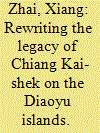

|
|
|
|
|
| Summary/Abstract |
The intensifying disputes between China and Japan over the Diaoyu Islands today have reminded both academia and the general public of the Ryukyu problem. Reportedly, during the Cairo Conference in 1943, Chiang Kai-shek let slip opportunities to recover the Ryukyus, which later resulted in Japanese control of the Diaoyu Islands. Until now, scholarship has maintained that Chiang narrowly missed regaining Okinawa at Cairo, which never again appeared on his agenda. However, a more nuanced historical account can be found in rarely accessed primary resources such as Chiang's diaries and presidential papers, which yield a different conclusion—that he was, in fact, committed to the Ryukyu issue throughout his political career. However, Chiang lost multiple opportunities to resolve the issue as a result of competition with his communist rival, the security dynamics of the Cold War, and his personality. Chiang eventually failed to stop America from returning the Ryukyus to Japan, which, thereafter, generated the Diaoyu Islands disputes and continues to serve as a primary source of nationalist friction today in Sino–Japanese relations.
|
|
|
|
|
|
|
|
|
|
|
|
|
|
|
|
| 9 |
ID:
141451
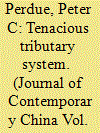

|
|
|
|
|
| Summary/Abstract |
Recently, some writers on Chinese foreign relations have argued that the tributary system is a useful concept for describing imperial China's relations with its neighbors, and that it can even serve as a model for the future of international relations in East Asia. An examination of China's historical practice of foreign relations shows that there was no systematic tributary system, but instead multiple relationships of trade, military force, diplomacy and ritual. Furthermore, China's neighbors did not accept the imperial center's definition of hierarchy and subordination, but interpreted ritual relationships in their own way. Even in the 1930s, when scholars invoked Chinese history to advocate peaceful relations, they recognized the importance of military force, colonial settlement and domination in East Asian state relationships. The current myth of the tributary system ignores historical reality and misleads us about China's true position in East Asia and the world.
|
|
|
|
|
|
|
|
|
|
|
|
|
|
|
|
| 10 |
ID:
141452


|
|
|
|
|
| Summary/Abstract |
The tianxia trope has been advanced as an organizing principle for post-Cold War international relations encompassing the rise of the People's Republic of China. The tianxia system is defined as a Sino-centric hierarchical relationship among unequals, governed according to Confucian principles of benevolence. As traditionally practiced, it incorporated an important role for the observance of ritual, including the presentation of tribute to the emperor as Son of Heaven, purportedly resulting in a Pax Sinica. Its supporters believe that, if adopted in today's world, tianxia would constitute a great improvement over the anarchic Westphalian system of theoretically equal states who possess sovereignty, i.e. inviolability within their own borders. Because they answer to no superior authority, the Westphalian system is by its very nature conducive to discord and war. This article will argue that both the tianxia and Westphalian systems have serious flaws and were rarely practiced as either their proponents or detractors argue. However, even states whose domestic autonomy is compromised by internal dissent and whose weaknesses prevent their playing an influential role internationally have vested interests in maintaining adherence to the Westphalian system, if only as a bargaining position. The PRC government itself has accepted the principles inherent therein through such actions as joining the United Nations and becoming a signatory of the Five Principles of Peaceful Coexistence. It zealously defends its sovereign prerogatives when useful, even as it makes efforts to educate the world on the virtues of a Confucian Great Harmony, and its supporters advocate following a somewhat nebulously defined Chinese model. In the absence of compelling incentives for major players in the current international system to adopt the tianxia system, Westphalian sovereignty appears likely to remain the organizing principle of international relations for the foreseeable future, its serious deficiencies notwithstanding. To paraphrase Winston Churchill's remarks on democracy, it may be the worst form of government except for all the others.
|
|
|
|
|
|
|
|
|
|
|
|
|
|
|
|
|
|
|
|
|